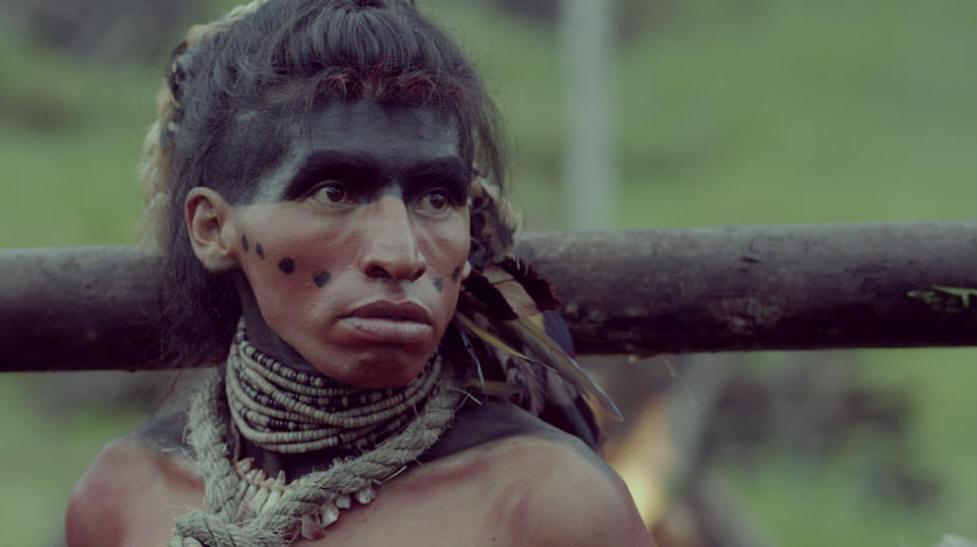
Saturday, February 19, 2011
PHOTOS |
COMING SOON|
EXAMINER.COM FILM ARTICLES
||HOME
MOVIE REVIEW
Even The Rain (También La Lluvia)
A Salute To The Indigenous
And Zinn, Via Satire
 Daniel, you're a star: Juan Carlos Aduviri as Daniel in "Even The Rain (También
La Lluvia), directed by Iciar Bollain.
Vitagraph Films
Daniel, you're a star: Juan Carlos Aduviri as Daniel in "Even The Rain (También
La Lluvia), directed by Iciar Bollain.
Vitagraph Films
by
Omar P.L. Moore/PopcornReel.com
 FOLLOW
FOLLOW
Saturday,
February 19, 2011
Crackling satire, "Even The Rain (También La Lluvia)" is Iciar Bollain's sublime
film-within-a-film, paying tribute to indigenous peoples and the late Howard
Zinn and his landmark book A People's History Of The United States.
Shot in Cochabamba, Bolivia, the film is a social commentary on Spain's
centuries of imperialism in Central and South America during the 15th century.
"Even The Rain" also highlights a contemporary problem: the government's control
and privatization of water in Bolivia, circa 2000, prior to the arrival of
populist Evo Morales as the country's president in 2006.
A Spanish movie production on location in Bolivia, led by its self-centered
director Sebastian (Gael Garcia Bernal), is under strain from the protests of
Cochabamba's local residents demanding that control of the water be ceded to the
people. The film's condescending producer Costa (Luis Tosar, "Miami Vice")
forges an uneasy relationship with a local, Daniel (Juan Carlos Aduviri), hired
as an extra at Sebastian's insistence. Daniel's enthusiasm in earning a
few dollars from his film role is exceeded by his commitment to the protests
that have galvanized Cochabamba's residents. Before long the line between
art and life has blurred.
"Even The Rain" mixes cocky, amusing self-awareness with moralizing underscored
in the film's serious moments, each of which are accompanied by music. The
score rings somewhat hollow and a little self-mocking. That's either
another level of satire the film shrewdly and often cuttingly wields, or a
function of inopportune music edits. More clear however, are the points
Ms. Bollain and the film's writer Paul Laverty make. Imperialism has come
full circle, reinforced on a micro-level within the confines of a movie set
slapped down in the middle of Cochabamba -- by its very nature an invasion and
inconvenience. Some of the film's "movie" scenes are more real and jarring
than "Even The Rain" is, and therein lies its ingenuity.
The out-of-towners impose an environmental violence of their own making, and Ms.
Bollain's cameras capture all of these events, which often feel like a
documentary. One of the film's devastating moments is a scene played
out in a presidential palace where the filmmakers visit the country's
highest-ranking politician. Though not nearly as powerful as anything Mr.
Zinn chronicled so powerfully in his writings, "Even The Rain" occasionally
challenges, lobbing acerbic dialogue that pounces into the viewer's heart,
leaving pangs of pain and quiet, uneasy contemplation.
Ms. Bollain's satirical history film is at its best when it forces its audience
to think about the relationships and alliances between the hosts and the
invitees. Who are the invitees? Who are the hosts? Who really
are the invaders? The protesters or the film's producers? "Even The
Rain" hired many real-life local residents of Cochabamba, reinforcing another
layer in this terrific movie, which opened in San Francisco and additional U.S.
cities yesterday.
"Even The Rain" is thoroughly compelling from start to finish, sustaining its
entertainment value all the way through. Its heart and conscience
unmistakably resonate in the final 20 minutes. Ms. Bollain's film may be
at its weakest during parts of its climax but it's also at its most heartfelt
and sincere. "Even The Rain" fully commits itself to its stated cause long
after its rapid-fire volley of equivocations surrounding politics, history and
cultural elitism have ceased. None of the film's characters are saints;
neither are they absolute villains. Or are they?
The ensemble cast are good, and Mr. Tosar particularly so as Costa, a producer
who has to soul search in order to reconcile what he may have wrought in the
city he's a stranger to. The director uses Costa as a proxy for the larger
historical rapacious beings from Spain who brought Bolivia and other Latin
American and South American countries to their knees with violence, murder and
wholesale theft of the indigenous peoples' resources -- after which the thieves
called those they had pillaged "third world" people.
"Even The Rain" is an excellent and important work. Though some may squirm
when watching, the nervy reactions will at the very least be good exercise in
the activation of conscience. You know that some of what you are watching
is wrong. You feel it. You may be inclined to do something: maybe
not use the term "third world" again. It is likely that the filmmakers
(and by extension the late Mr. Zinn) would appreciate that as a start, if
nothing else.
With: Karra Elejalde, Carlos Santos, Raul Arevalo.
"Even The Rain (También La Lluvia)" is not rated by the Motion Picture Association Of
America. It contains foul language and some bloody violence. The
film is in the Spanish language with English subtitles. The film's running time is one hour and
44 minutes.
 FOLLOW
FOLLOW
SUBSCRIBE TO THE POPCORN REEL MOVIE
REVIEWS RSS FEED
